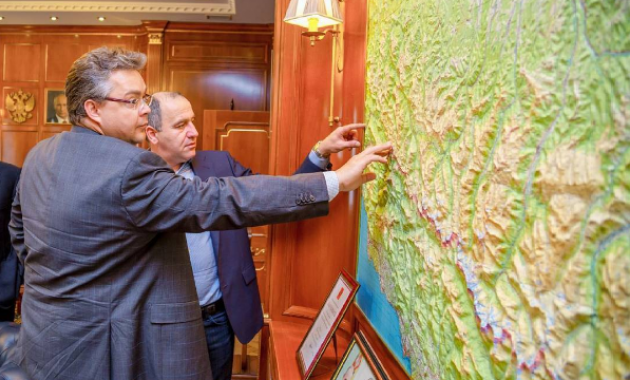
Inter-Ethnic Land Conflicts Threaten Borders in North Caucasus
Publication: Eurasia Daily Monitor Volume: 14 Issue: 98
By:

Since the end of the Soviet system, the greatest source of conflicts in the North Caucasus has been neither Islamism nor nationalism but rather property—over who controls this or that piece of land. The collapse of industry in the cities only intensified this problem in recent decades: many people in the region were either forced to flee or to return to the countryside, even as the situation there was exacerbated by fast population growth and differences in the relative sizes of the local nationalities and ethnic groups over time. All this was further magnified by the use of such developing conflicts by ethnic engineers who sought to mobilize support for themselves and their causes by playing up the ethnic grievances of those who already felt discriminated against when it comes to property.
Until now, such conflicts were typically small and isolated. They tended to involve groups that few beyond the borders of the North Caucasus knew much about, and they seldom attracted much attention in the Russian media or among Western analysts. But today, this is almost certainly about to change because regional conflicts over land, already long ago invested with ethnic meaning, are threatening to spark new demands for adjustments to the borders of the republics of the North Caucasus. Understandably, the Kremlin fears such border changes will add to its problems there and could even threaten its control of the North Caucasus in the future.
Notably, Makhachkala’s recent mishandling of the Nogay crisis has led members of that group and other nations residing in the republic to talk about pulling out of Dagestan altogether. Sometimes these nationalities have acted with the support of outsiders, like Chechen leader Ramzan Kadyrov, and sometimes independently (see EDM, July 11). Indeed, this situation has reached such a tense point that local observers are now calling the current political season in Dagestan “a hot summer” (Nazaccent.ru, July 22; windowoneurasia2.blogspot.com, June 19).
Then in mid-July, two territorial disputes—one between Stavropol krai and Dagestan and a second between Stavropol krai and Karachaevo-Cherkessia—have apparently come to a head. The first involves a long-simmering quarrel between Stavropol and Makhachkala over the fate of 50,000 hectares of land in the predominantly ethnic-Russian krai that most Dagestanis believe they should have control over as a historic right. The second is more immediately serious because Moscow has decided to side with the ethnic-Russian-majority region to oppose the demands of the leaders of Karachaevo-Cherkessia (Capost.media, July 24; Kavpolit.com, July 21). In particular, the second dispute involves control of a reservoir on the border between the two federal subjects. In Soviet times, the Eshkakon reservoir belonged to the Karachais and Cherkess; but since the early 1990s, it has been the property of the federal government in Moscow, which is thus in a position to control how its water is used by the local authorities in Stavropol and Cherkessk. As such, this is a powerful lever that the Russian government has repeatedly utilized in the past—akin to how Moscow exploited its supervision of water rights in Central Asia, in Soviet times.
At a meeting, on July 15, in Stavropol, Valentina Matviyenko, the speaker of the Russian Federation Council, and Lev Kuznetsov, Russia’s minister for North Caucasus affairs, called for keeping the federal government’s current ownership but giving Stavropol de facto control of the water use from Eshkakon. The justification given for such a decision was that the other littoral political unit, Karachaevo-Cherkessia, had supposedly allowed the reservoir to decline to what they described as “a catastrophic state.” Not surprisingly, the head of Karachaevo-Cherkessia, Rashid Temrezov, dissented. He declared that the reservoir “must never ‘be handed over’ to Starvopol under any conditions.” Temrezov’s tough stance was no surprise: last month, his republic’s parliament voted to take control of the reservoir from Moscow (Capost.media, July 24; Kavpolit.com, July 21).
This exchange sets the stage for new conflicts, with each side staking out public positions and even taking actions that will make it more difficult for either to back down. The likely outcome is thus going to be a serious challenge to existing borders in the region. Any change in local administrative borders, however, could generate additional pressure in favor of splitting up the still-existing binational North Caucasus republics, Karachaevo-Cherkessia and Kabardino-Balkaria, which join together Turkic peoples with Circassians. In addition, it could open the way for the restoration of a Greater Circassia, and for demands by republic leaders across the region for border changes to incorporate into their own territories lands they see as ethnic irredentas improperly handed over to others, such as Chechen areas presently included in Dagestan.
Despite the mythology that has arisen about the enduring borders in the former Soviet Union, a mythology driven by current concerns, in fact the Communist government frequently modified the borders of union republics and even more frequently redrew the borders of the non-Russian republics within the Russian Soviet Federative Socialist Republic (RSFSR), the predecessor of today’s Russian Federation (Paul Goble, “Can Republic Borders Be Changed?” RFE/RL Report on the USSR, September 28, 1990). Since Mikhail Gorbachev’s time, Moscow has been allergic to any change, fearful that it could trigger uncontrollable disintegration. Indeed, to date, the only border that changed in the North Caucasus was the one that was established when Chechnya and Ingushetia broke apart in 1990. But the latest regional developments suggest that status quo is far from permanent, and the growing pressure for altering borders in the North Caucasus could very much undermine Moscow’s interests.



